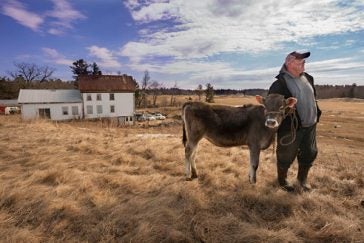 Dairy farmer Fred Stone said he never knew the sludge from sewage treatment plants that he applied to his hayfields for decades could be contaminated by PFAS – chemicals increasingly linked to cancer, liver damage, low birth weight and other health concerns.
Dairy farmer Fred Stone said he never knew the sludge from sewage treatment plants that he applied to his hayfields for decades could be contaminated by PFAS – chemicals increasingly linked to cancer, liver damage, low birth weight and other health concerns.
More than two years after learning of the contamination, Stone estimates he is losing between $415 and $450 a day to operate his farm as he dumps 100 or more gallons of fresh milk daily because of lingering contamination. The Kennebunkport, Kennebunk and Wells Water District also was required to install a filter on a well on Stone’s land that was used to supply water to local residents.
Public health advocates on Tuesday called for Maine to ban the use of municipal sludge as fertilizer and to phase out PFAS that has ruined an Arundel farmer’s livelihood and contaminated a public water source.
STEEP researcher Dr. Laurel Schaider said the levels of PFAS considered safe have been dropping lower as more research is conducted into potential health impacts. Schaider said that with more than 4,600 variants of PFAS, there is no clear understanding of the extent of contamination or the risk that poses.
“PFAS along with its chemical cousins … are extremely persistent in the environment, meaning they don’t break down,” Schaider said at Stoneridge Farm. “This means that pollution from older legacy sources continue to be sources of PFAS exposure well into the future.”
You can read the full story in the Portland Press Herald and Seacoast Online.
For more information on how PFAS enter into the food web—including through sludge—check out STEEP’s Table Tips: Food for Thought.

